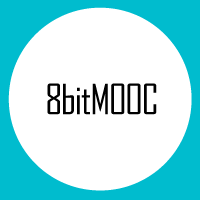Barry Peddycord III, North Carolina State University
Much of the hype around Massively Open Online Classes seems to be fixated on the “massive” component. Courses on Coursera and Udacity boast tens to hundreds of thousands of participants learning together from their expert lecturers and their peers, submitting work on projects ranging from artificial intelligence to history. However, the “open” component is less explored. While most of these courses are open in the sense that anyone can take them, the fact is that the only individuals “open” to teach these courses and have their message heard are those with the backing of elite educational institutions and venture capital dollars, leaving the many experts of the world with a voice that barely makes a ripple in the “massive” audience in the balance.
#8bitmooc is an experiment and endeavor in openness, being built completely in the spirit of Open Source Software such as Firefox and Linux. Unlike other MOOCs, developed behind a curtain until they are ready to be revealed to the world, #8bitmooc is proudly offered in its beta form, with its Github source code open not only to students, but to suggestions, assistance, and collaborators. There are experts hidden amongst the crowd, and in the same way that every user is a developer in waiting, every student can potentially be a teacher when the course and its leaders are open to their ideas and willing to help them along the way to becoming a valued, lasting contributor.
#8bitmooc is an online course/experiment wherein students take on the tools and challenges of game developers in the 1980s and develop a game for the 1985 Nintendo Entertainment System. The computer programming experience that the students take part in is meant to serve as a lens by which they examine the deeper questions as to why old video games looked and behaved the way they did, how the limitations of the system and language made certain approaches to game development infeasible, and how the way the hardware was designed influenced how users – both programmers and gamers – interacted with it.
The website provides the technological platform where students perform the coding portion of the course. Automatically-graded challenges help students gain competency in programming by providing instant feedback on whether their code is right or wrong, and an open-ended sandbox lets students explore the features of the NES at their own pace and share their creations with their peers and the world. Students can engage with their peers by hacking their code and improving upon it, or discussing deeper questions at length in the forum, chat rooms, blogs, or social media. Even when students “finish”, the website remains open to help them stay in touch with their collaborators, better their content knowledge, and perhaps even contribute back to the course by working on the Github project.
#8bitmooc is on schedule to begin in September. What remains to be seen is how students actually engage the course, and what it takes for students to go from being consumers of online learning to contributors to a project of a greater scope.
Additional resources:
http://github.com/isharacomix/8bitmooc
Tags: MOOC, Open Education Resource, Programming
Posted in Gallery |
